28 Mar 2025
BlogOverview
Ethical business is fundamentally about integrating moral principles and values into every facet of a company’s operations. This approach emphasises integrity, fairness, and transparency—elements that are crucial for fostering trust among stakeholders. Organisations that prioritise ethical practices not only bolster their reputations and enhance customer loyalty but also experience improved financial performance and heightened employee satisfaction. This demonstrates the tangible benefits of a robust ethical framework in business. By adopting such practices, companies can position themselves as leaders in their industries, ultimately prompting action towards a more ethical marketplace.
Introduction
In a world where consumers and employees increasingly prioritise corporate responsibility, the urgency for ethical business practices has reached a critical point. Companies are recognising that integrating moral principles into their operations transcends mere compliance; it is a strategic imperative that drives success and fosters loyalty.
The benefits of ethical practices are profound and far-reaching, enhancing brand reputation and improving employee engagement. This article explores the core principles of ethical business, the essential role of leadership, and real-world case studies that demonstrate how organisations can thrive by embracing integrity, transparency, and sustainability.
As businesses navigate the complexities of modern challenges, a steadfast commitment to ethical standards will be pivotal in shaping a responsible and prosperous future.
Defining Ethical Business: Core Principles and Concepts
Ethical business enterprises exemplify the seamless integration of moral principles and values into every aspect of their operations. This unwavering commitment is reflected through integrity, fairness, and transparency, elements that are vital in fostering trust among stakeholders. Core principles such as honesty, accountability, and respect steer decision-making processes, ensuring that businesses not only comply with legal standards but also uphold a superior level of ethical conduct, which profoundly influences company performance.
Research reveals that 84 percent of employees believe corporate social responsibility (CSR) initiatives enhance an organisation’s transformative capacity, while 80 percent assert that such initiatives can significantly strengthen loyalty. This data underscores the tangible benefits of purpose-driven strategies in nurturing a loyal customer base and boosting employee engagement. Furthermore, 68 percent of organisations have reduced or ceased collaborations with nonprofits to allocate funds for new initiatives, signaling a shift toward more impactful CSR efforts.
Defining moral principles necessitates a commitment to minimising societal and environmental harm while maximising positive contributions. Companies like The Body Shop and Patagonia stand as exemplary models, prioritising sustainability and social responsibility within their operations. Their practices reflect a broader trend, with 93 percent of workers expecting their organisations to lead with intention, and 88 percent deeming it unacceptable for businesses to profit at society’s expense.
Moreover, the current landscape indicates that only 46 percent of leaders believe their organisations operate with a strong sense of intention, highlighting a significant gap in moral leadership. This gap emphasises the urgent need for organisations to not only develop CSR initiatives but also ensure that employees are informed and engaged with these efforts.
Incorporating ethical business values into operations transcends mere compliance; it represents a strategic imperative that can propel success. By cultivating a culture of integrity and transparency, companies can forge an ethical business that enhances their reputation, strengthens stakeholder relationships, and ultimately leads to improved project outcomes. Edmond Shipway’s comprehensive construction consultancy services, including project management, cost consultancy, and Mechanical and Electrical Consultancy, are meticulously designed with a focus on sustainability and the pursuit of Net Zero Carbon.
Their Mechanical and Electrical Consultants specialise in building services that enhance energy efficiency and mitigate CO2 emissions, further exemplifying their commitment to sustainable practices. Additionally, Edmond Shipway’s legacy in cost consultancy remains a cornerstone of their operations, ensuring the delivery of high-quality services while nurturing robust client relationships. This steadfast commitment positions the firm as a leader in ethical business operations within the construction consultancy sector.
As the industry evolves, Edmond Shipway’s focus on responsible commercial conduct will be pivotal in shaping a sustainable future.
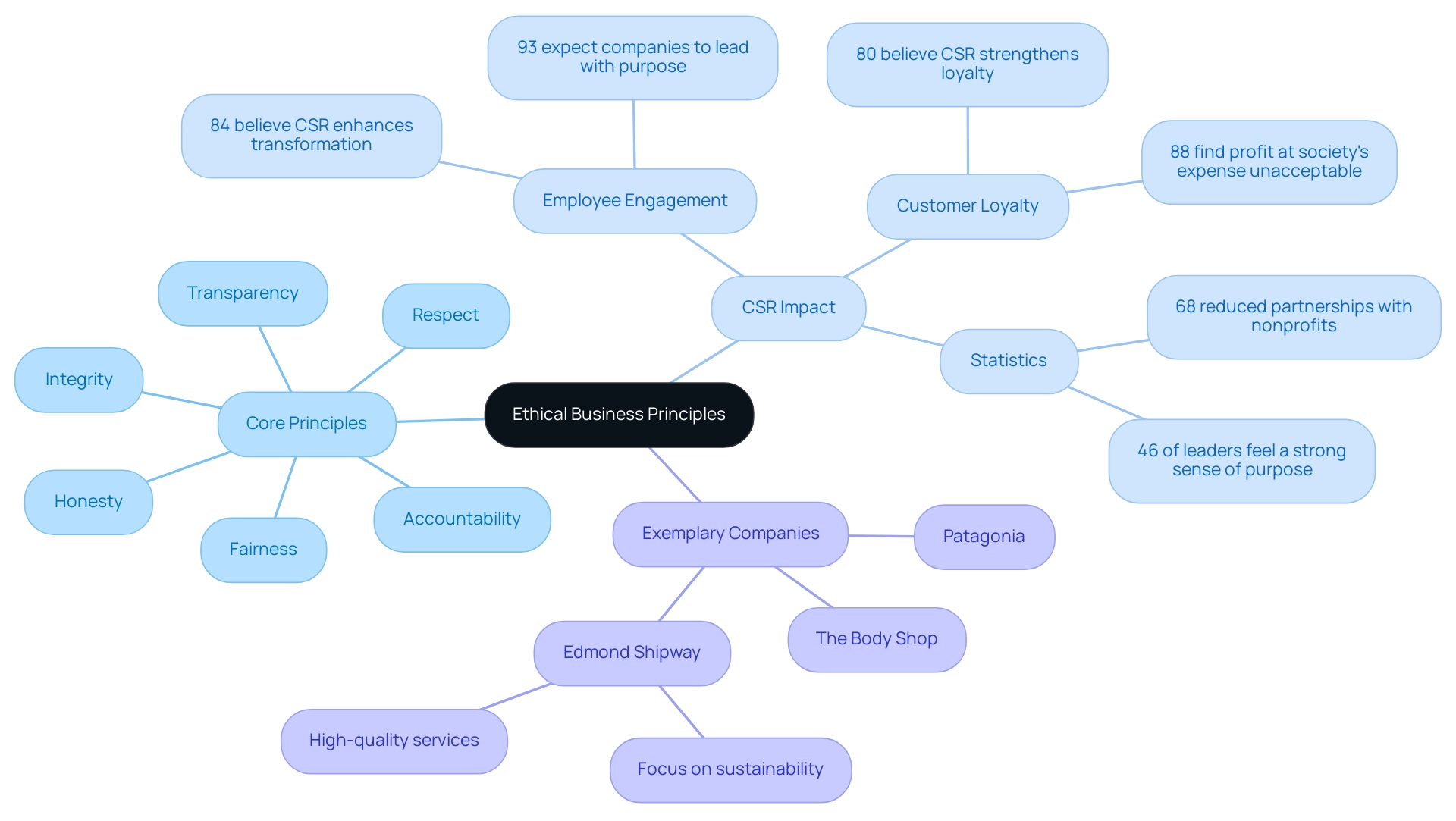
The Importance of Ethical Behavior in Business Success
Ethical conduct serves as a cornerstone of business success, fostering trust among stakeholders, including staff, customers, and investors. Businesses that prioritise moral standards frequently enjoy enhanced reputations, which leads to greater customer loyalty and elevated employee satisfaction. Research indicates that organisations with strong moral cultures significantly outperform their competitors, with studies demonstrating that such companies can exceed by 10% over a five-year period.
This correlation underscores the financial advantages of maintaining a robust moral framework, a principle that aligns with Edmond Shipway’s commitment to innovative methods and strong client relationships.
Moreover, ethical conduct acts as a safeguard against risks related to legal issues and reputational damage, ultimately supporting a sustainable operational model. In the construction industry, for example, implementing fair labour policies and responsible sourcing practices not only enhances a brand’s image but also resonates with consumers who increasingly prefer to support companies that align with their values. A 2022 survey revealed that 87% of consumers are more likely to purchase from businesses that advocate for issues they care about, highlighting the growing significance of corporate social responsibility.
Organisations that integrate these foundational elements are more likely to experience a positive impact on their overall performance and staff morale.
In conclusion, the adoption of responsible practices not only enhances a company’s image but also strengthens its financial outcomes, establishing it as a crucial component of sustained success, particularly in the hospitality industry where moral considerations are becoming increasingly essential.
Benefits of Embracing Ethical Practices in Business
Adopting ethical business approaches offers significant advantages for companies, enhancing their reputation, fostering customer loyalty, and boosting workforce morale. Companies that prioritise ethical practices are often viewed more favourably by consumers, leading to increased sales and a larger market share. For example, Starbucks has cultivated strong brand loyalty through its commitment to responsible sourcing and community engagement, demonstrating how moral commitments resonate with consumers.
Moreover, organisations that implement robust moral frameworks are better positioned to attract top talent. Potential employees increasingly seek out ethical companies that align with their personal values. This alignment not only enhances workplace satisfaction but also contributes to a more engaged and productive workforce. Research indicates that organisations focusing on moral standards experience an impressive 37% increase in worker satisfaction, correlating with greater productivity and reduced turnover.
In addition to these internal benefits, principled companies are more adept at navigating regulatory challenges and minimising the risk of costly legal disputes. This proactive stance not only protects their operations but also supports long-term sustainability. Notably, companies with strong Environmental, Social, and Governance (ESG) frameworks are reported to be 21% more profitable over the long term, underscoring the financial viability of principled practices.
The impact of responsible sourcing on consumer purchasing decisions is profound. As consumers become increasingly aware of corporate responsibility, they are more likely to support brands that demonstrate a commitment to ethical practices. This shift in consumer behaviour highlights the competitive advantage that principled firms can achieve, reinforcing the necessity of integrating ethical approaches into corporate strategy for sustained success.
Edmond Shipway’s commitment to innovative methods and strong client relationships enhances project outcomes, positioning the firm as a reliable partner in the construction consultancy sector while also fostering team growth through organised career paths and continuous support.
Currently, we are seeking motivated individuals for key positions, including a RICS qualified Quantity Surveyor and an Electrical Engineer, to join our exceptional team and contribute to a sustainable future.
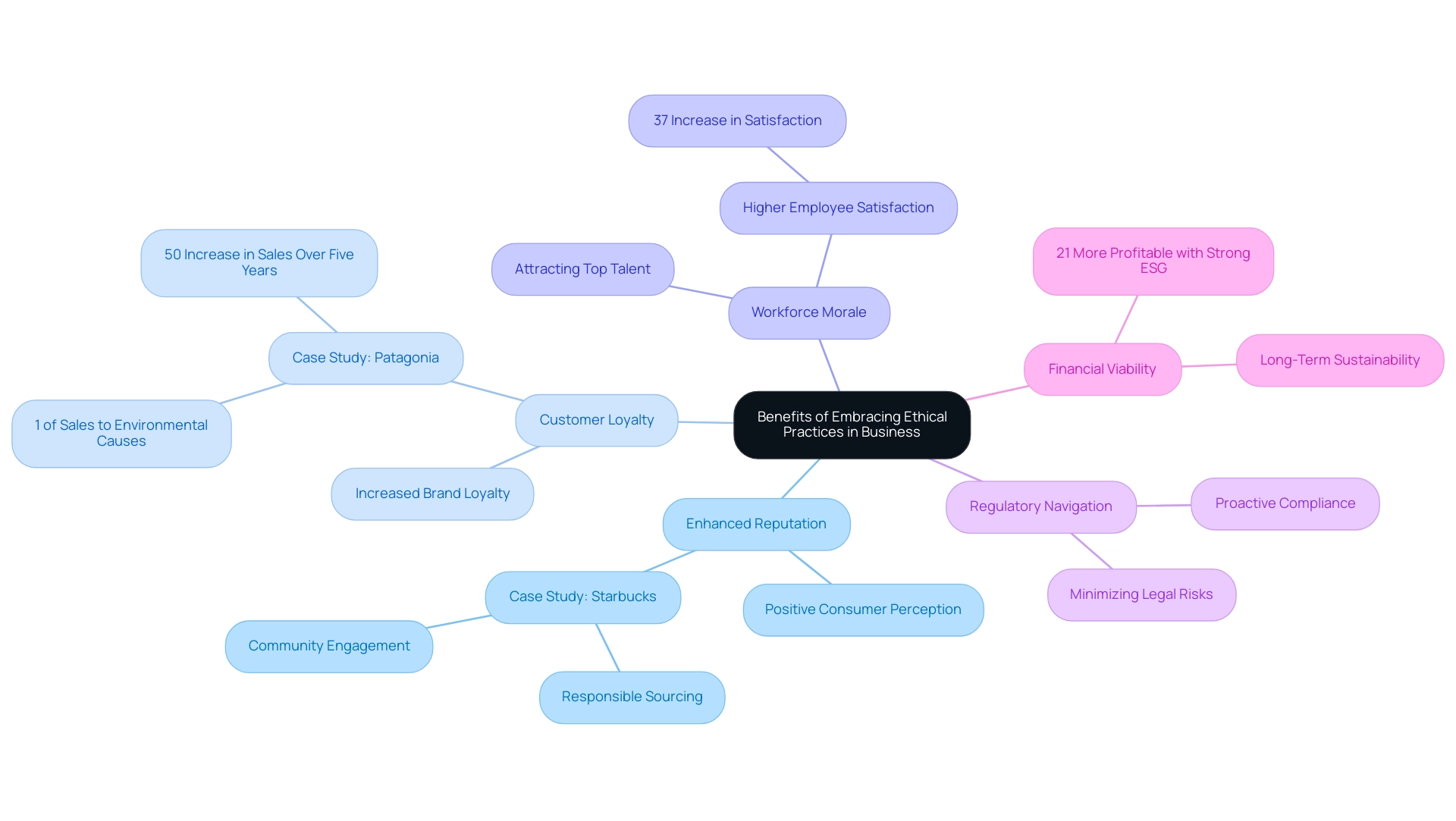
How Ethical Values Influence Employee Engagement and Retention
Ethical values are pivotal in shaping staff engagement and retention within organisations. By prioritising principled practices, organisations foster a culture of trust and respect, significantly enhancing staff satisfaction and loyalty. When employees perceive their organisation as committed to moral principles, they are more likely to feel valued and connected to its mission, directly influencing their decision to stay.
Research demonstrates that organisations with robust moral cultures experience lower turnover rates and increased productivity. In the construction industry, for instance, principled leadership can elevate staff morale and cultivate a sense of belonging among workers. This not only leads to improved service delivery but also enhances client satisfaction.
Moreover, statistics reveal that disengaged employees are 48% more likely to experience daily stress, underscoring the importance of engagement in maintaining a healthy workplace. Organisations that invest in ethical business principles and workforce experiences illustrate the tangible benefits of such strategies. Additionally, flexible work arrangements have proven to boost staff satisfaction and loyalty by honouring work-life balance and personal needs.
By integrating ethical business practices and moral principles into their operations, and actively soliciting employee feedback, evidenced by the fact that 52% of employees believe change will result from a survey, construction firms can achieve high employee retention rates, ultimately contributing to a more sustainable and prosperous model.
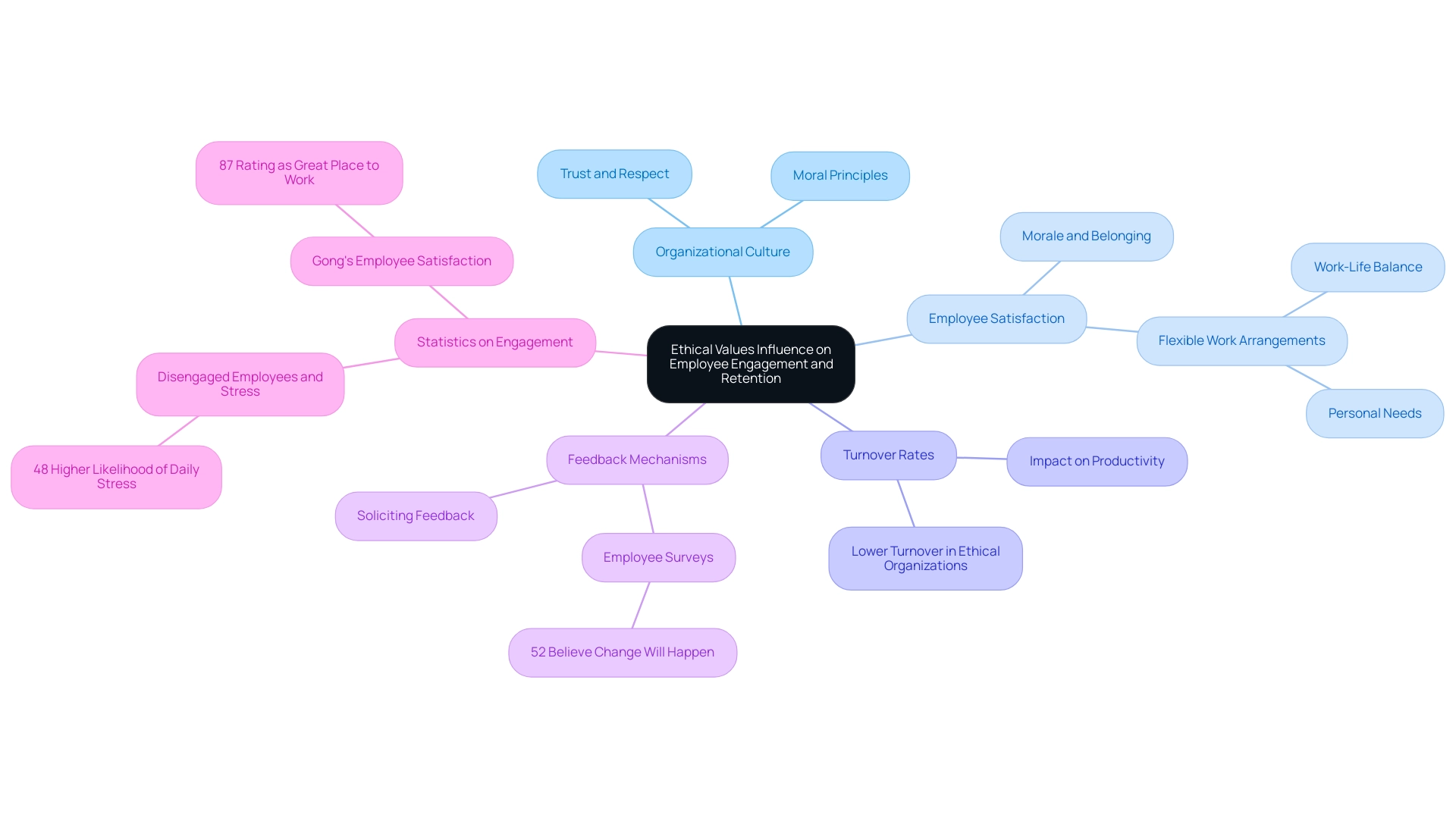
Challenges in Upholding Ethical Standards in Business
Maintaining ethical business practices presents significant challenges, particularly in the construction sector, where financial pressures and competitive dynamics often clash with moral considerations. Organisations frequently navigate the delicate balance between profit motives and the moral imperatives of ethical business, leading to complex dilemmas. For instance, the sector often feels the urge to reduce costs, which can compromise sourcing or labour practices. This situation is exacerbated by the lack of clear moral guidelines, leaving staff uncertain about acceptable behaviours.
A robust moral framework is crucial for ethical business, encompassing essential components that encourage and maintain principled conduct within organisations. Statistics reveal that a staggering 93% of employees believe that companies should operate with a purpose, and 88% deem it unacceptable for businesses to profit at society’s expense. This sentiment underscores the necessity for organisations to develop and communicate their ethical business initiatives and corporate social responsibility (CSR) effectively.
To navigate these challenges, businesses must establish strong moral frameworks for ethical business that not only define acceptable practices but also provide comprehensive training to staff. Nurturing a culture of accountability is crucial for an ethical business, promoting principled decision-making at all levels. The case study titled “Employee Expectations for Purpose-Driven Companies” reinforces the idea that organisations must effectively communicate their CSR initiatives, as 93% of employees believe companies should lead with purpose.
By prioritising moral standards, hospitality companies can enhance their reputation, build trust with stakeholders, and ultimately contribute to an ethical business and a more sustainable and responsible industry.
The Role of Leadership in Fostering an Ethical Business Environment
Leadership is essential in fostering an ethical business environment, particularly in the construction sector. Ethical business leaders not only model integrity and transparency but also establish clear expectations that resonate throughout the organisation. By promoting a culture of ethics where staff feel empowered to voice concerns and report unethical practices without fear of retaliation, these leaders create a safe and supportive workplace.
Consider construction companies that emphasise principled decision-making; they frequently observe a ripple effect, motivating their teams to adopt similar values and fostering a unified organisational culture.
Studies indicate that principled leadership significantly enhances staff engagement and retention. Employees are more inclined to remain with organisations that align with their personal values, resulting in lower turnover rates and higher morale. A study exploring the connection between leaders’ moral behaviours and worker well-being found that principled leadership positively impacts staff emotions, thereby enhancing overall wellness.
This connection underscores the significance of principled leadership in not only shaping organisational culture but also in promoting staff satisfaction and loyalty.
Moreover, incorporating ethical business practices through principled leadership encourages corporate responsibility and aligns company strategies with societal values, ultimately boosting long-term resilience and profitability. As organisations navigate the challenges of the contemporary corporate environment, the role of principled leaders becomes increasingly essential in cultivating an ethical business culture that benefits both staff and the organisation as a whole.
Integrating Sustainability into Ethical Business Practices
Incorporating sustainability into ethical operations is essential for addressing urgent issues such as climate change and social inequality. Ethical businesses recognise their responsibility to minimise environmental impacts and promote positive societal contributions. This integration manifests in various ways, including sustainable sourcing, waste reduction, and the promotion of fair labour conditions.
Consider the construction sector, where companies are increasingly embracing eco-friendly approaches. By utilising renewable energy sources and sourcing local ingredients, they bolster their sustainability credentials. This shift is not just beneficial; it is imperative for long-term success.
Edmond Shipway’s Mechanical and Electrical Consultancy plays a pivotal role in this transition, specialising in building services that focus on energy efficiency and reducing CO2 emissions. Our consultancy employs methodologies such as:
- Energy audits
- Sustainable design principles
- Innovative technology solutions
to help hospitality developers significantly lower energy costs while contributing to a Net Zero Carbon future.
The significance of sustainability is underscored by recent statistics:
- 54% of Gen Z and 48% of millennials are urging their employers to implement sustainability measures.
- A notable 46% of Gen Z and 42% of millennials have already altered or intend to alter jobs due to climate issues, emphasising the increasing need for environmentally responsible corporate approaches.
As noted by Deloitte, this shift in workforce expectations highlights the necessity for companies to prioritise sustainability to attract and retain talent.
By aligning ethical business practices with sustainable approaches, companies can create long-term value for stakeholders while contributing to a healthier planet. Companies that embrace sustainability not only manage environmental risks proactively but also enhance employee satisfaction, which is increasingly vital in today’s competitive job market. For instance, sustainable firms are better positioned to adapt to changing market conditions, as they can anticipate and respond to evolving consumer preferences and regulatory requirements.
Case studies demonstrate the successful incorporation of sustainability into ethical business practices. Companies in the industry that have embraced eco-friendly initiatives report enhanced performance and customer loyalty. For example, the case study titled “Adaptability to Changing Market Conditions” illustrates how sustainable firms are better equipped to anticipate and respond proactively to market changes, maintaining resilience amid uncertainty.
By prioritising sustainable sourcing and operational methods, these companies not only meet the expectations of environmentally conscious consumers but also set a benchmark for industry standards.
Ultimately, the incorporation of sustainability into responsible commercial methods is not merely a trend; it is an essential evolution for enterprises aiming to succeed in a swiftly changing world. As the sector continues to embrace these principles, it will pave the way for a greener future, benefiting both the industry and the planet.
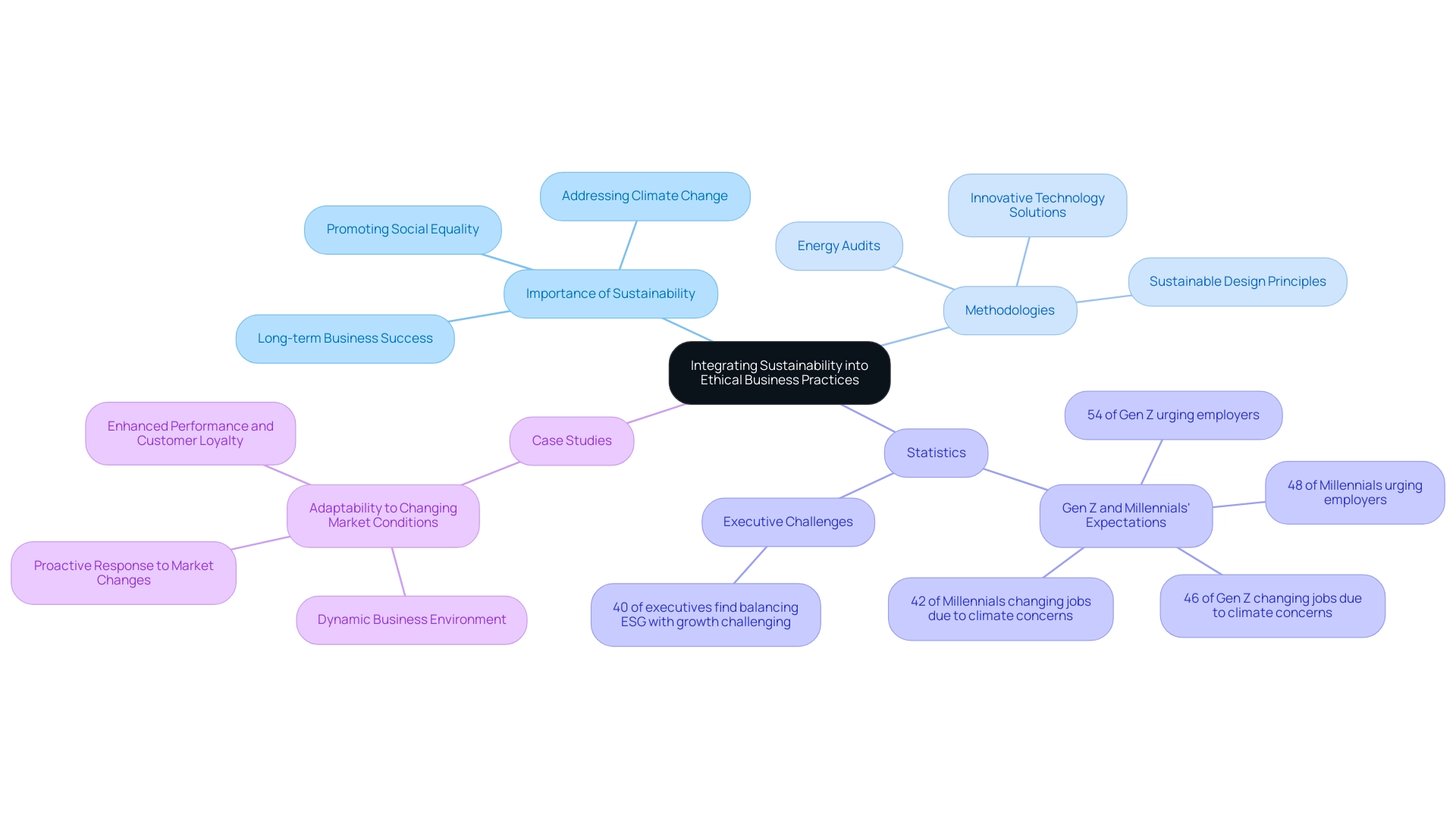
Case Studies: Successful Ethical Business Practices in Action
Many companies have successfully integrated moral practices into their operations, establishing themselves as exemplary models for others in the industry. Ben & Jerry’s is particularly notable for its unwavering commitment to social justice and environmental sustainability, seamlessly embedding these values into its core business model. This dedication not only enhances their brand reputation but also fosters deep customer loyalty, as consumers increasingly seek brands that resonate with their values.
Similarly, Patagonia has cultivated a strong identity centered on responsible sourcing and environmental activism. Their initiatives strongly resonate with consumers who prioritise sustainability, demonstrating that responsible methods can significantly influence purchasing decisions. These case studies illustrate that companies adopting principled approaches not only contribute positively to society but also experience heightened brand loyalty and long-term profitability.
The influence of principled corporate practices extends beyond individual firms; it shapes industry norms and consumer expectations. For instance, research indicates that companies with strong moral commitments often enjoy a competitive advantage, as consumers are more inclined to support brands that align with their values.
Philosopher Jeremy Bentham’s perspective on act-utilitarianism emphasises the importance of making decisions that may conflict with ordinary moral intuitions, enriching the discourse on the significance of ethics in commerce. Furthermore, monitoring and evaluation efforts, as demonstrated in the School Enterprise Challenge project, greatly enhance project performance, linking these methods to responsible commercial operations.
Moreover, the case study titled ‘Fairness in Salary and Employment Statistics’ examines moral issues related to salary disparities, providing a concrete example of moral considerations in commerce. By learning from th successful examples, businesses can adopt ethical practices that not only reflect their values but also contribute to a more sustainable and equitable future.
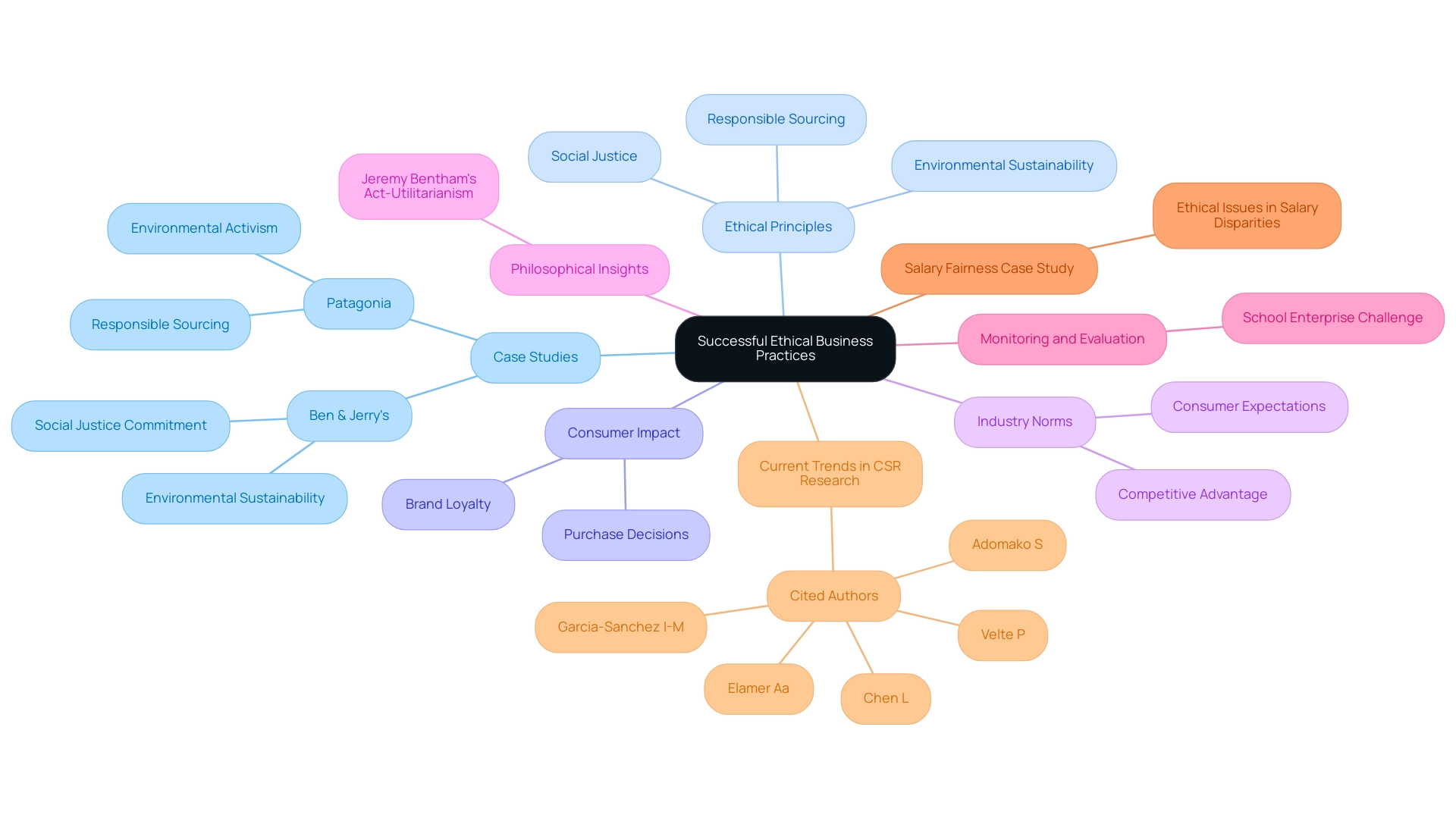
Conclusion
Ethical business practises are essential for organisational success, employee engagement, and consumer loyalty. By integrating principles such as integrity, transparency, and accountability, companies can transcend mere legal compliance and meet stakeholder expectations. Research shows that businesses prioritising ethics not only enhance their reputations but also outperform competitors, cultivating a loyal customer base.
Leadership plays a pivotal role in this endeavour. Ethical leaders empower employees to uphold these standards, resulting in improved morale and retention—both critical for sustainable practises. Brands like Patagonia and Ben & Jerry’s illustrate how ethical commitments can drive brand loyalty and profitability, proving that ethical practises yield both moral and financial benefits.
Moreover, integrating sustainability into ethical strategies is crucial for tackling challenges like climate change and social inequality. Companies aligning their operations with these principles are better equipped to adapt to evolving consumer preferences and regulatory landscapes.
In conclusion, a commitment to ethical standards is not merely a trend; it is a strategic necessity for businesses striving to thrive in today’s complex environment. By embracing ethical and sustainable practises, organisations can create lasting value for stakeholders and contribute to a responsible future. This dedication to ethics will shape business success in the years to come, establishing integrity and sustainability as fundamental components of modern operations.
Share


